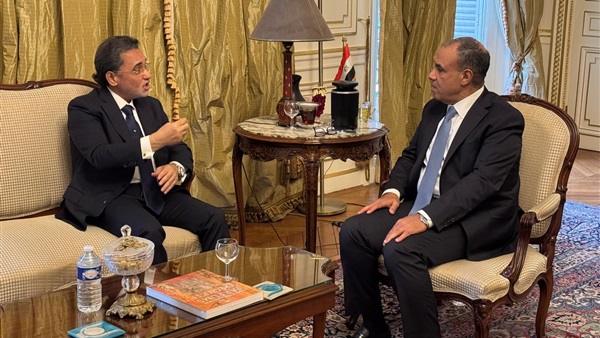Badr Abdel Aty and a Friendly Talk: On Ending the War in Gaza and the UNESCO Elections

Inside
the halls of the Egyptian Embassy in Paris—once the majestic palace of French
nobleman “Larousse Vicot,” who sold it in 1922 to his friend King Ahmed Fouad—I
met Dr. Badr Abdel Aty, Egypt’s Minister of Foreign Affairs. It was a reunion
after a long absence; we had only met face to face once before, most likely in
2018, when he was Egypt’s ambassador to Germany, although our friendly
relationship has spanned more than a decade.
In
the office of the esteemed Ambassador Alaa Youssef, we had a warm and friendly
conversation, not a traditional press interview. The minister’s schedule was
packed, especially since his visit to Paris was primarily to support Egypt’s
candidate for the post of UNESCO Director-General, Dr. Khaled El-Anany.
Naturally, I asked him about the latest developments in Gaza, Egypt’s plan for
the next stage, its role in Hamas’s acceptance of Trump’s proposal, and the
factors Cairo is relying on to ensure the success of the U.S. president’s plan.
Our
conversation also touched on the chances of the Egyptian candidate winning the
UNESCO elections, particularly after France officially announced its support,
along with the Arab League’s unanimous decision to endorse Dr.
El-Anany—something that has never happened before in the history of these
elections.
The Recovery Phase
The
minister began by saying that Egypt’s primary concern was to stop the war,
ensure the Palestinian people remain on their land, and block any attempts at
displacement or annexation. “That is why we welcomed President Trump’s
initiative,” he explained, “because it placed these three factors at the
forefront. It is only natural that, over time, we will discuss how to implement
the other provisions with our partners. But the priority now is to stop the war
and launch the recovery phase.”
He
clarified that this phase involves providing temporary housing for the people
of Gaza whose homes were destroyed by the Israeli invasion, as well as setting
up educational institutions—whether by using UNRWA facilities, constructing
quick wooden structures, or linking students to online learning platforms. It
also includes the immediate entry of sufficient food aid to save Gaza’s
population from famine, in order to revive hope and strengthen their attachment
to their land ahead of the next steps.
The
minister added that Gaza’s tragic situation had to end one way or another,
regardless of other issues that can be addressed later. Hamas and the
Palestinian factions realized this when they announced their preliminary
acceptance of President Trump’s plan.
He
went on to explain that the coming stage will involve comprehensive discussions
about all aspects of the plan, but what matters now is carrying out the first
stage: a ceasefire, the release of hostages, and a partial Israeli withdrawal,
paving the way for the completion of a full withdrawal. This would create the
opportunity to form a technocratic Palestinian team to administer Gaza, under
the direct supervision of President Trump and his international team overseeing
the reconstruction process.
The
Security Phase
On
restoring security, the minister noted that there are 18,000 Palestinian
Authority troops in Gaza, from whom 5,000 under the age of 40 could be selected
to maintain security, prevent chaos, and deter destabilization attempts.
As
for the guarantees to ensure Israel fulfills its obligations after receiving
the hostages, Dr. Abdel Aty stressed that the main guarantor is President Trump
himself. Egypt trusts his ability to compel Israel to honor its commitments,
including full withdrawal and the release of Palestinian prisoners in parallel
with the hostage exchange. He added that this matter will be the subject of
urgent talks in Cairo between Hamas and Israeli delegations.
The
minister praised Hamas’s wisdom in accepting the principle of a ceasefire
without raising reservations at this stage, so that the first phase of the
agreement can move forward and the people of Gaza can be saved from famine and
displacement. “Naturally,” he added, “there will later come a time for detailed
negotiations on the rest of the plan. These may be lengthy, but they must
ultimately lead to comprehensive peace and the establishment of a Palestinian
state based on the two-state solution.”
UNESCO
Regarding
the UNESCO elections, the minister emphasized that Egypt had previously sought
to put forward candidates but had not succeeded for various reasons. “Now,” he
said, “it is time for an African and Arab figure to lead this international
organization, as it would have a positive impact on its performance.”
He
explained that Egypt has exceptional assets enabling it to represent both the
Arab and African sides, in addition to its accumulated civilization that
reflects a unique diversity—Pharaonic, Coptic, Arab, Islamic, and
modern—forming a distinctive cultural alloy. Adding to this, the Egyptian
candidate Dr. Khaled El-Anany is a highly respected Egyptologist of proven
competence, making this round different and bringing us closer than ever to
victory.
The
minister stressed that this is the first time in UNESCO election history that
the Arab League has unanimously endorsed an Egyptian candidate, alongside the
host country France’s official support. He concluded: “We hope to bring the
Egyptian people the good news of victory in this prestigious international
position next Monday, God willing.”









